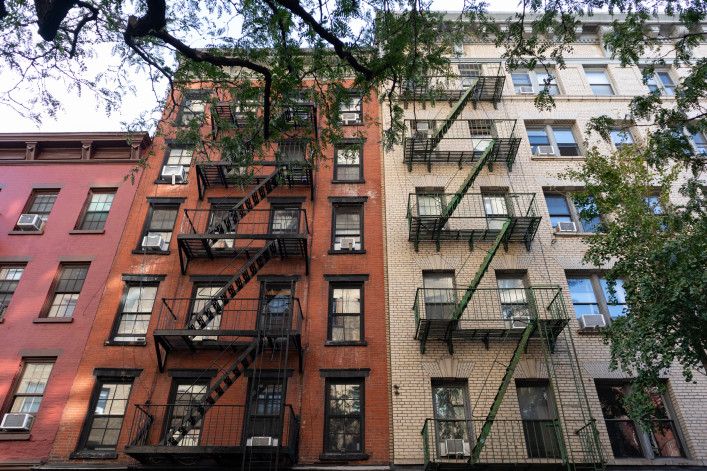Ask Sam: A new twist in a fight against a landlord who tenants say illegally de-regulated their apartments
- The case concerns how to calculate the legal regulated rent and rent overcharges for about 78 apartments
- Apartments were illegally destabilized while the building's owner received J-51 tax benefits

“This case flows from the Roberts decision in 2009, which held that apartments in buildings that received J-51 benefits and were deregulated after the benefits expired, in fact remained rent stabilized,” attorney Sam Himmelstein says.
James Andrews via Getty Images
A new ruling from the New York State Court of Appeals will affect the way rent is calculated for a group of rent-stabilized tenants in a building where the landlord received J-51 tax abatements and illegally de-regulated the apartments.
“This case flows from the Roberts decision in 2009, which held that apartments in buildings that received J-51 benefits and were deregulated after the benefits expired, in fact remained rent stabilized,” says Sam Himmelstein, an attorney at Himmelstein McConnell Gribben & Joseph who represents residential and commercial tenants and tenant associations. “As a result of that ruling, our firm was retained by several tenant associations to pursue class action lawsuits against landlords who deregulated apartments.”
The case in question concerned how to calculate the legal regulated rent, and rent overcharges, for approximately 78 apartments that were illegally destabilized while the building was receiving J-51 tax benefits.
“The lawsuit was filed in October 2011. After the lawsuit was filed, the landlord engaged in what we described as egregious conduct,” says Ronald Languedoc, an attorney at HMGJ. “The landlord contacted many of these tenants individually and told them they had recalculated their rent, and their legal rents were much higher than what they had been charged. In some cases it was double or triple what they were paying.”
In 2017, the State Supreme Court ruled in the tenants’ favor. By falsely recalculating the rents after the lawsuit was filed, the landlord had engaged in an en masse scheme intended to defraud the tenants, the ruling stated.
“Because of the landlord’s conduct, the Supreme Court held that the default formula should be applied for each of these apartments,” Languedoc says. “The default formula is a method for calculating legal rents when there has been a fraudulent scheme or no adequate rental history records are available.”
The landlord appealed the decision to the Appellate Division, and, in 2021, the tenants prevailed. However, the landlord was granted a second appeal, to the Court of Appeals, the highest Court in New York State. On this second appeal, the landlord’s attorneys raised the issue of whether the en masse improper recalculation of the rents required the application of the default formula, where there were, in many cases, records showing what was actually charged.
Under the applicable law, there was a so-called “base date” rule: When an apartment was illegally deregulated, the courts could only look at rental records from four years prior to when a lawsuit was filed—even if the apartment was deregulated before that date. The legal rent for the apartment would then be calculated based on whatever the rent was four years before. (The Rent Stabilization Law was amended in 2019 to eliminate the base-date rule, but the prior law applies in this case because the lawsuit was filed before 2019.)
There was an exception, though, for fraud: if an apartment was deregulated in a fraudulent scheme, the courts would apply the default formula to determine the new legal rent, rather than use the four-year rule.
“The point raised by the landlord’s attorneys was that the egregious recalculation of the rents took place after the four-year base date, and in many cases, records existed showing the actual rent charged on the base date. Therefore, the landlord’s attorneys argued that the recalculation of the rents could be disregarded, and the Court could set the base date rent based upon records showing what was actually charged at that time.”
The Court of Appeals agreed with the landlord’s position, and determined that the recalculated rents could be disregarded, and the legal rent could be calculated pursuant to records showing what was actually charged on the base date.
For the tenants, this means that the case will now be remanded to the trial court level, in order to look at each apartment on a case-by-case basis to determine whether or not there are adequate rental records to calculate the new legal rents.
This ruling is fairly narrow, Languedoc says, and should not impact how future courts determine whether a landlord has conducted a fraudulent scheme.
For tenants who suspect their apartments have been illegally deregulated, “they have the right to investigate that base date rent,” Languedoc says. “A lease might look credible on its face, but the tenant has right to investigate on their own or with an attorney to confirm whether that’s really the case or not.”
Related:
Ask Sam: How do I find out if my apartment should be rent-stabilized—and if the landlord owes me money? (sponsored)
Ask Sam: I found out my apartment used to be rent-stabilized. Now what? (sponsored)
Read all our Ask a Renters Rights Lawyer columns here.
Sam Himmelstein, Esq. represents NYC tenants and tenant associations in disputes over evictions, rent increases, rental conversions, rent stabilization law, lease buyouts, and many other issues. He is a partner at Himmelstein, McConnell, Gribben & Joseph in Manhattan. To submit a question for this column, click here. To ask about a legal consultation, email Sam or call (212) 349-3000.

























